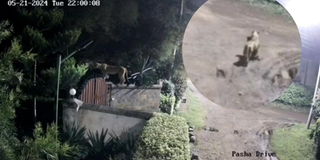Lioness that attacked dogs in Rongai captured

A lioness caught on CCTV scaling a boundary wall and snatching a pedigree dog from a private residence in the Nazarene area.
Kenya Wildlife Service (KWS) rangers in Rongai, Kajiado County, have captured a stray lioness that has been killing dogs and scaring residents.
On Monday, January 20, the rangers successfully captured the third and final lioness that had been roaming Rongai, according to KWS Corporate Communications Manager Paul Udoto.
Mr Udoto told Nation.Africa that the update follows weeks of efforts to secure the lioness, who has been identified by a distinctive ear notch and is thought to be the mother of two younger lions, also recently captured in the vicinity. The situation escalated after CCTV footage showed the lions moving through residential areas, with one of them apparently attacking dogs.
“Yesterday (Monday), a lioness was captured in Sorora Drive, Rimpa, Kajiado North, by the KWS team. Confirmed by her distinctive ear notch, she is believed to be the mother of the two lions captured earlier in the same area,” he said.
Upon capture, the lioness was found to have sustained injuries, which could be an indication of having been attacked by residents.
The KWS veterinary team administered immediate treatment, and the lioness has since been reintroduced to Nairobi National Park. This capture coincides with the recent evacuation of another lion from Sorora Drive, believed to be one of her offsprings.
The capture comes a few days after rangers and vets from KWS last week safely captured another lion that strayed from Nairobi National Park into Ongata Rongai on the outskirts of Nairobi.
The wildlife agency said that the young male lion was safely captured in the same homestead where a lioness was trapped earlier this month.
“The lion will be released back to Nairobi National Park, after a health check at the KWS Vet Clinic,” KWS said in a statement.
Last week, another lioness was also captured in the same area after it strayed from Nairobi National Park.
“The captured lioness was a threat to the public and had been involved in several incidents of domestic animal predation,” Mr Udoto said.
The lioness was captured on CCTV scaling a boundary wall and snatching a pedigree dog from a private residence in Nazarene residential area.
In a statement, KWS said the Human-Wildlife Conflict team was pursuing the lioness after the CCTV footage went viral on social media.
“Our Human-Wildlife Conflict (HWC) team is actively pursuing the dangerous big cat. KWS assures residents that the HWC team continues to patrol the area, supported by the more experienced Problem Animal Management Unit (PAMU),” the agency said then.
“The public is informed that heavy rains, such as those experienced recently in Nairobi, cause herbivores to migrate through the unfenced southern part of Nairobi National Park towards settlements such as Rongai, Kitengela, Athi-Kapiti and the wider Kajiado area and its environs, where waterlogged soils and areas of over-long grass provide hiding places for predators.”
KWS added that these conditions attract predators such as lions, leopards and hyenas, which follow their prey into these areas.
“This movement of predators leads to unfortunate incidents like the one captured on CCTV,” it added.
Wildlife straying from Nairobi National Park into surrounding communities is a recurring issue. As the only wildlife park situated within a city, Nairobi National Park presents significant challenges that contribute to human-wildlife conflicts.
The onset of rains has prompted prey to migrate to the unfenced southern section of the park, which, in turn, attracts predators into populated areas.
Recent rainfall in Nairobi National Park has increased the likelihood of predators like lions, hyenas, and leopards venturing into nearby human settlements.
The wet conditions prompt prey species to migrate to the southern part of the park, which remains unfenced and borders residential communities such as Rongai, Kitengela, and the broader Kajiado region.
Last year, women in Ongata Rongai told KWS to stop hunting down the dog-eating lioness that made news headlines.
The lioness, which has so far eaten at least six dogs in estates in Ongata Rongai, was praised by the women from the area who even referred to it as their heroine.
At the time, they said that all their husbands in Ongata Rongai returned home by 6pm each day of the week as lioness was restoring families to a “factory setting.”
According to KWS 80 per cent of Nairobi National Park is fenced, meaning the animals have escape routes, but assured that the city is safe from wildlife attacks.
Cases of human-wildlife conflict in Rongai have escalated in recent years as the human population has increased and encroached on areas originally occupied by wildlife.
hkimuyu@ke.nationmedia.com


